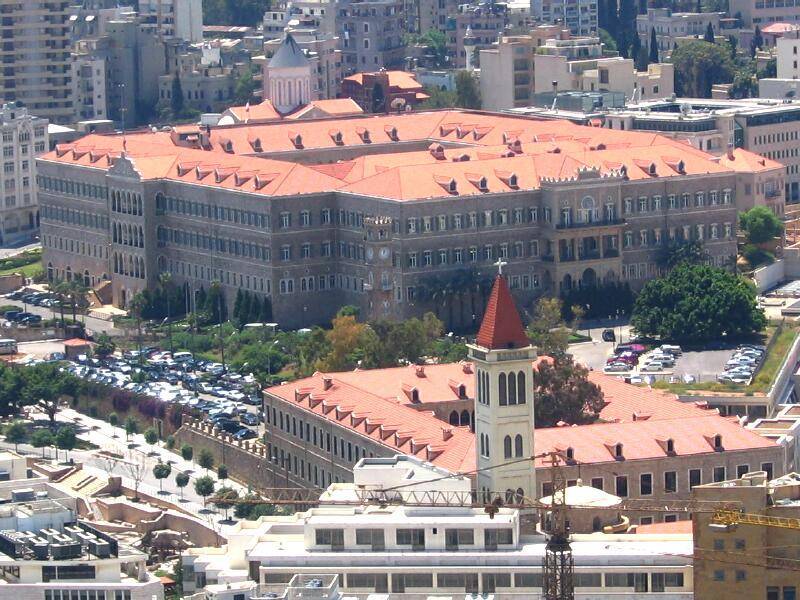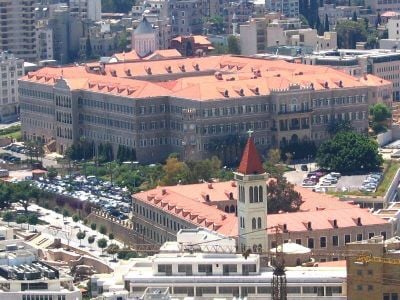
The Grand Serail in Beirut. (Credit: Photo under Creative Commons license)
Lebanon has often been described as a country of missed opportunities, but it can also be described as a country of recurring crises and stalled reforms. At the onset of each new crisis, the focus of policymakers, politicians and even citizens shifts to that crisis. For instance, in a matter of months, attention shifted from the presidential vacancy to the governorship of the central bank and then to vacancies in the Military Council. These crises and the recent war on Gaza and the south diverted attention, at least for the time being, away from economic reform to urgent matters, including those imposed by the recent military conflict.
Despite these crises, or perhaps because of them and their frequent occurrence, more emphasis should be placed on macroeconomic and structural reforms. These reforms should alleviate the burden of these crises and pave the way for a better economic future that is more resilient and less susceptible to external shocks.
Lebanon’s recurrent problems have slowed the reform process, further complicating the economic situation, which has been exacerbated by the absence of any significant progress over the past few years. Implementing economic and structural reforms in extremely complex circumstances is a major challenge, especially on the legislative front when Parliament is fragmented and no parliamentary block is large enough to make tough decisions. Add to this the government’s reluctance to fully endorse the economic and financial reform program it approved more than 18 months ago, making those who promote and push for economic reforms appear as outcasts.
The public has not been of much help either, partially due to the nature of the prevailing political system. In fully functional democracies, people galvanize their representatives to undertake economic measures required to address economic problems that affect everyone’s lives. Economic issues feature prominently in election campaigns. Failure to take necessary remedial actions usually costs politicians their parliamentary seats in the next electoral cycle. However, this is not necessarily the case in Lebanon. Democracy in Lebanon is flawed due to the existing sectarian system. Most people remain loyal to their sectarian leaders, sometimes at the expense of their own interests. Thus, politicians are not ousted due to their stance on key economic issues, despite their significance. Instead, they could be voted down for failing to strongly oppose other sectarian leaders or not staunchly defending the interests of their own communities.
The existing political system in Lebanon is ill-equipped to make timely economic policy decisions. The decision-making process is extremely difficult and protracted, and agreements on important matters are only reached when politicians perceive that these decisions serve their interests. This implies that such agreements are not necessarily in the country’s best interest but are rather outcomes of a lengthy and intricate bargaining process, proving to be costly given the high value of time.
What also impedes the reform process in Lebanon is the lack of trust between citizens and officials, not only regarding economic matters but also on all fronts. The majority of Lebanese doubt everything the government does, within a prevailing culture that opposes any idea or proposal put forward by a government official, regardless of the merit of the proposal or the identity of that official. Some media outlets fuel and deepen this culture of distrust to the extent that discussing economic policies in the media becomes as popular as, or more popular than, discussions in political forums. In economics, the effectiveness of economic policies greatly depends on the credibility of these policies. In the absence of this credibility, even well-designed policies may fail to achieve their intended goals.
As I already wrote, the lack of trust between citizens and officials means that the social contract in Lebanon has been broken. It is the duty of authorities to regain this trust, including through significant efforts to convince citizens that the state is serious about reforms for the benefit of all. Enhancing transparency and accountability, enforcing laws and order, and combating corruption are some measures that should be pursued to repair the relationship between citizens and authorities.
In this context and in an effort to renew the social contract, the government recently approved the establishment of several committees to work on many critical areas including: reforming the income tax system and establishing a modern and fair tax system; reforming the public sector and state-owened entrprises affiliated companies; upgrading the information technology system in government institutions; amending and updating the public accounting law; and reforming the customs sector, among other reforms. However, due to the limited capacity in the relevant ministries, implementing such reforms will take a long time.
Undertaking significant reforms of this kind is challenging in any country, but more so in Lebanon. Attempting to solve all problems simultaneously, as some politicians demand, is impossible. Therefore, implementing a fundamental reform in a specific priority area should not be conditional on the implementation of all other reforms. As mentioned some weeks ago, these cannot wait until we solve all the other structural problems, such as fighting corruption, smuggling or changing the political system, as these inherently take time. This does not mean neglecting these matters, but, on the contrary, they must be addressed seriously and concurrently.
The size and multitude of problems we face are unprecedented, and we fully comprehend the weight of responsibility and the difficulties that beset the reform process. However, there is mutual interest in adopting the necessary economic policies in the context of well-defined priorities. Linking any reform step in a particular issue to the execution of all other reforms leads to undermining the reform process altogether. It is imperative to start somewhere and strive to set Lebanon on the right track.
Saade Chami is Lebanon's deputy prime minister in its current caretaker government.
